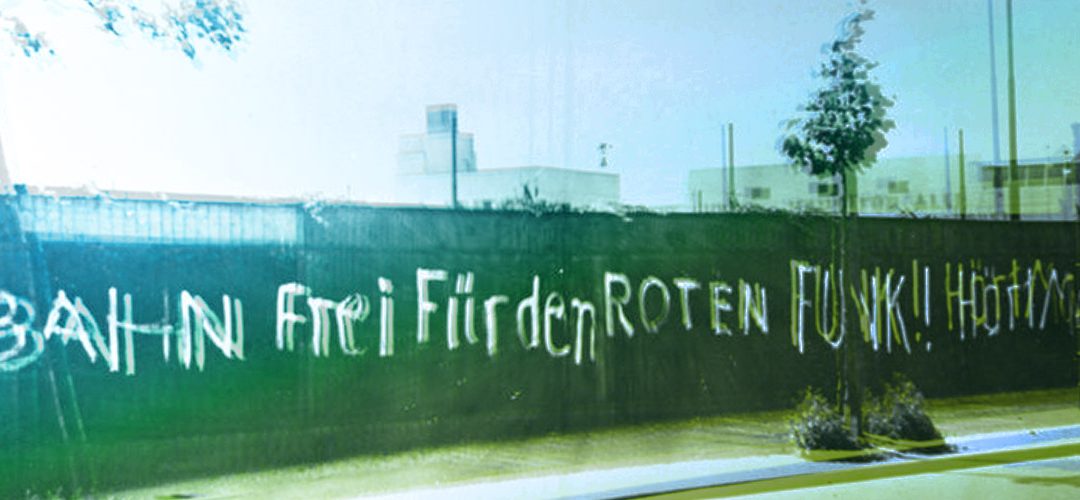“Broadcasting would be the greatest conceivable communication apparatus in public life, if it could not only transmit, but also receive, relate to the listener.”
Bertolt Brecht (shortened), 1932
Before the Internet existed – this must be remembered occasionally – media were a one-way street: There was a transmitter and a receiver. What came out of the printing press was read, what was on the radio or television was heard and watched. Comments, e.g. letters from readers, were only published occasionally. There was also a lot of censorship: in Germany at the time of Karl Marx one could go to prison for printed matter critical of the government. From 1919, radio stations required a permit. And the technical hurdles for later television were so high that anything broadcasted there was controlled anyway.
But 70 years before the Internet became popular, there was a movement that wanted to turn the relationship between sender and receiver upside down: the workers’ radio movement. In small clubs, backroom tinkering and soldering was practiced by tech-enthusiastic women and – above all – men. The Arbeiter-Radio-Bund Deutschlands had about 10,000 members in 1926. From kits of electrical parts one could comparatively cheaply put together one’s own radio and receive news from all over the world.
The fact that for a long time there were only state broadcasting stations in Europe was not a natural condition.
It was the result of a state-controlled media policy. Right at the beginning of the new medium (around 1925) the course was set for who should have a say in the programming.
In the USA, there were from the beginning only local private stations that financed themselves through advertising. Some were banned because they advertised dubious products or spread political propaganda. They relocated their operations to Mexico, near to the border – and thus stay on air.
In orderly Germany, on the other hand, they had learned their lesson early on. When soldiers’ councils prematurely wired a victory of their revolution in Berlin in 1919, it became clear to the bourgeois and right-wing camp that radio must not fall into the hands of the Socialists. The fear of a radicalisation of the population was great and justified. From the outset, for example, a 51% share of state ownership was held in all stations in the Reich. Receivers were initially regarded as military technology and, unlike the USA, always had to be licensed.
Between 1924 and 1926, the distribution of registered receivers in Germany had increased more than a hundredfold (to 1.2 million). More than half of the devices were self-made – because buying a simple detector receiver would cost the equivalent of 80 skilled worker hours. Similar to today’s movements like Accessnow, it was therefore a question of democratic participation at that time.
It became clear that radio would become a powerful instrument of decision-making alongside the press – which proved fatally true only ten years later.
Times were turbulent, the workers’ movement had long since become a powerful political force. The Soviet Union was regarded as the first workers’ and peasants’ state and by many as an ardent role model. After the World War, the proclaimed soviet republics in Germany and Hungary could only be prevented by force. The workers had developed a complete counterculture, with their own sports, education, culture and ideals.
“Broadcasting is an important means of influencing the people, and therefore the Reich and the federal states cannot be blamed for not wanting to leave such an institution in the hands of private individuals without special official control.”
Hans Bredow, Broadcasting commissioner, 1925
A later admission shows that this approach was not committed to neutral broadcasting, but to the implementation of an own political agenda:
“If, misjudging the mood of the people, one had announced radio right at the beginning as an instrument for political opinion making, this intention would undeniably have met with strong resistance. (…) Therefore one had to proceed step by step and by fulfilling the desire for good entertaining presentations, try to achieve the widest possible distribution and wait (…) until one could also approach the political work without damage.”
Hans Bredow, „Im Banne der Ätherwellen“, 1956
Next to participation, the actual interest of the workers was to promote their own broadcasting content.
They wanted to have an influence on the programme design, to represent working class culture and political contents, to throw church services out of the programme. The procedure was typical for the Socialist movement in Germany: The Social Democrats asked for influence on existing broadcasters, the Communists demanded their own workers’ channel. The Arbeiter-Radio-Bund (Workers’ Radio Association) finally split over this question. From 1929, the Communists propagated the new German-language Radio Moscow station. Supporters of the Direct Action conducted pirate stations, which was dangerous.
“Whose air is this? … Ether is common property of all people, common property of all states.”
Arbeiter-Radio-Klub, June 1925
It is hard to reconstruct how many illegal channels existed in Europe and when. With a small transmitter one could be received only in a few kilometers’ distance. A permanent operation was inconceivalbe, since every minute on air increased the danger of a radio bearing.
How the history of radio then went on is all too well known.
„All the impertinence of the national circles, all the floppiness of the opposition lies in the fact that what these guys call ‘national attitude’ is assumed to be the normal.“Kurt Tucholsky, „Der politische Rundfunk“, 1926
The National Socialists used the prepared field in a masterly manner for their propaganda. By distributing cheap receivers, the so-called “Volksempfänger”, they further restricted the spectrum: only one station could now be received at all. And since 1933 this was at the service of the Propaganda Minister Joseph Göbbels for his merciless agitation. Listening to “enemy stations” was made a punishable offence and could in the worst case bring you to the concentration camp.
“In 1939, for example, I worked as a painter at Cologne Central Station. At the same time the soldiers for the western front were loaded there. This opportunity was used to lay out flyers in the waiting rooms to inform the soldiers about their true function in fascism.
In the same year a black station was operated jointly by an anarcho-syndicalist and a communist. During the broadcasts they drove through the city in a small van and ’commented’ on the propaganda speeches of the NSDAP on the radio. Unfortunately, this was only possible for a short time. They were searched with direction finders and the matter became too dangerous. Finally they had to even dismantle the transmitter because of the house searches.“Report from an anarchist from Cologne (Source)
The GDR was stupid eneough to continue the inglorious tradition of reception bans, although the reception of western stations usually remained with uninvited visits and admonitions. In the West, the traumatic experiences of the Nazi era led to the concept of public service broadcasting with its supervisory authorities.
But here, too, there were pirate radio stations, which at first supported the much frowned youth culture, but since 1968 have again brought political counter-publicity to the ears. They find today their correspondence in web pages and Podcasts. Getting stormed by the police, like Radio Dreieckland at that time, is a risk that no one has to expose themselves to today.
With the spread of the Internet, conditions have changed radically.
The technical situation and the political climate in today’s open societies have made it possible for anyone to publish any content in the first place. The question of relevance and quality is interpreted by search engines and editorial offices. The associated open questions about freedom of opinion, copyright, trustworthiness and disinformation still concern us today. The debates on the EU Copyright Directive show us that regulation is only now in full swing.
State attempts to get the system under control with upload filters and master keys (backdoors) have already had more success than we would agree with. Authoritarian states such as Russia or China are working at high pressure to prevent the free exchange of opinions, to isolate themselves nationally and to bring “their” Internet under central state control. A vivid example is the titling of supporters of the former Erdogan ally Gülen in Turkey as ’terrorists’ after a coup was blamed on them. And terrorists, as almost everyone agrees, should not be able to use the internet as their platform.
This cultural battle has not yet been decided.
What lessons can we learn from history?
• Political sovereignty of opinion is – not only in dictatorships – an important key to securing power. Any attempt to keep the Internet “pure” from hatespeech, fake news, pornography, copyright infringements, etc. provides a potential tool to silence the political opponent.
• At the latest when things get politically precarious, a leading political class will want to influence media content and its distribution. To this end, they use the means that are available at the moment.
• Technical conditions continue to have an effect and influence mentalities. Once a censorship infrastructure has been installed and accepted, it is no longer possible to get rid of it. The Germans, who once got involved in the monocanal of the Volksempfänger, had to suffer mental consequences for decades to come.
• Decentralized is better. Protections of the Internet against censorship are its flexible technical structure, open source solutions, blockchains and even the darknet. Organic diversity should not be sacrificed to a – eventually neurotic – cleanliness mindset.
• Media are important. For their freedom one must stand up in good times and decisively.
<<
Backgrund: In 1990/91 I had the opportunity to work for the legendary Berlin-based station Radio 100 and create a few own shows there. In this station many programming dreams of the radio pioneers were realized. From the support of the GDR opposition to gay-lesbian radio and nightly readings of cyberpunk literature, a broad spectrum of trends was represented there. The closure of the radio by a commercial “coup” (as we felt at the time) had made the radio landscape poorer. The classification of the number of listeners in the “non-measurable range” still makes me doubt the official surveys to this day – I didn’t know anyone at the time who didn’t listen to Radio 100.
A few sources, in German:
Audio: https://zwischenfaelle.radio-z.net/feature/arbeiterradiobewegung
In written:
• Die Arbeiterrundfunkbewegung der Weimarer Republik, Joachim von Geisau im Radio-Kurier
• Helge Franz: „Rundfunk In Der Weimarer Republik Der Arbeiter Radio Bund“
ISBN : 9783640267569
Photo: Bundesarchiv B 145 Bild-P046285, CC-BY-SA

